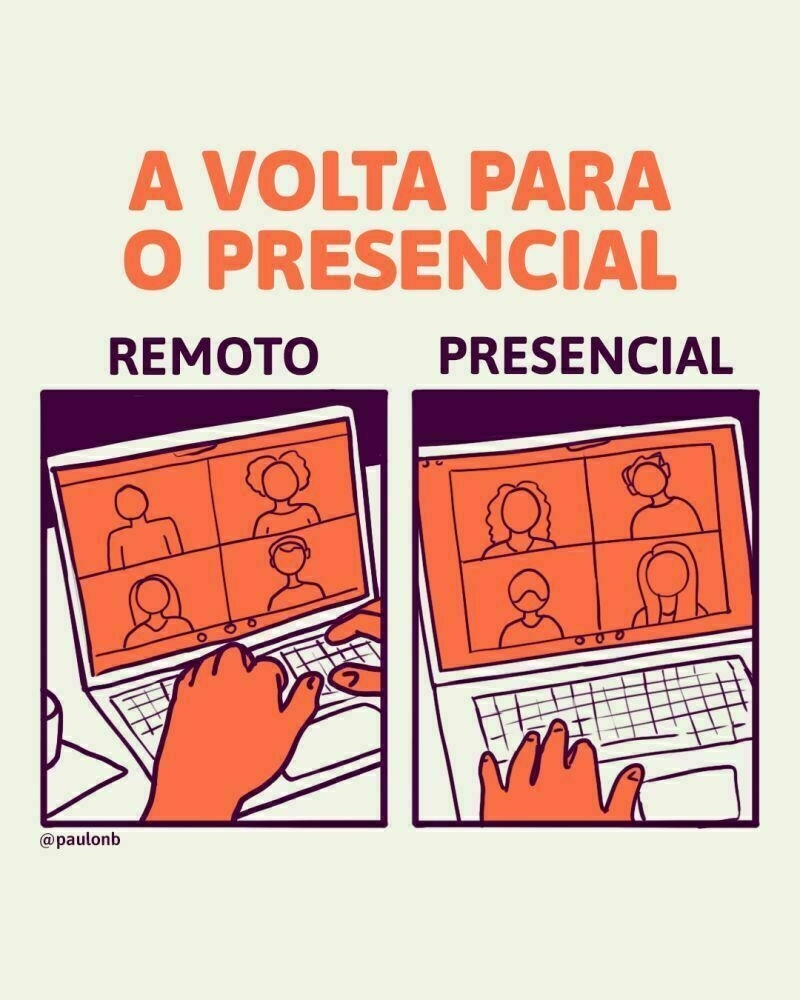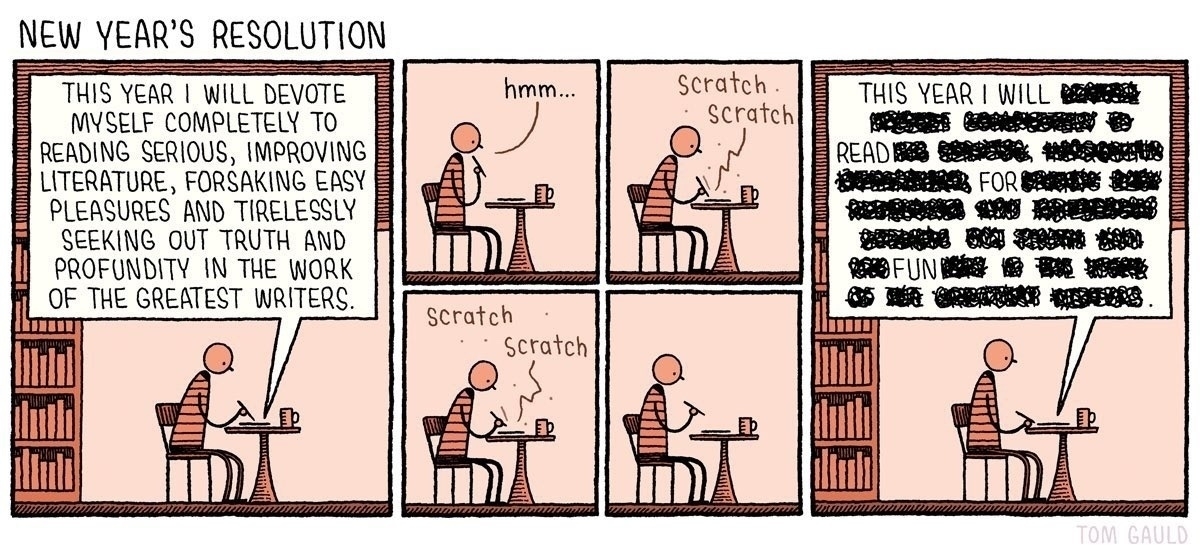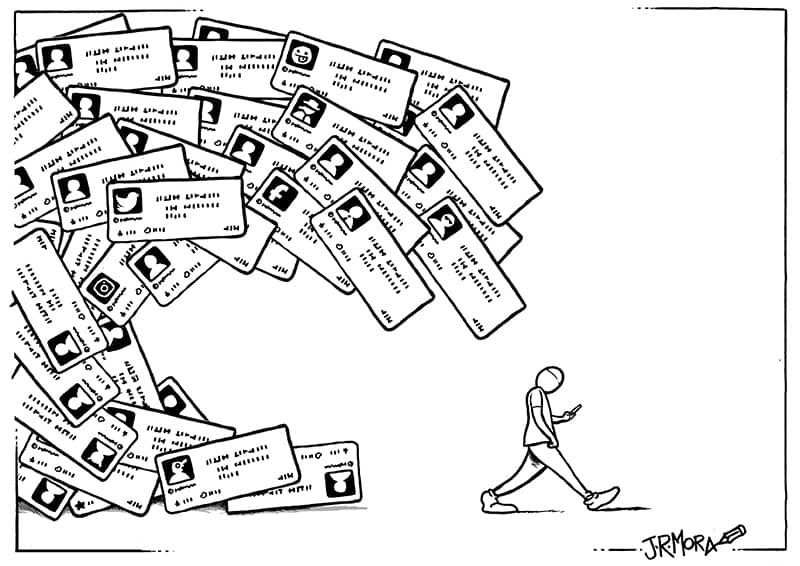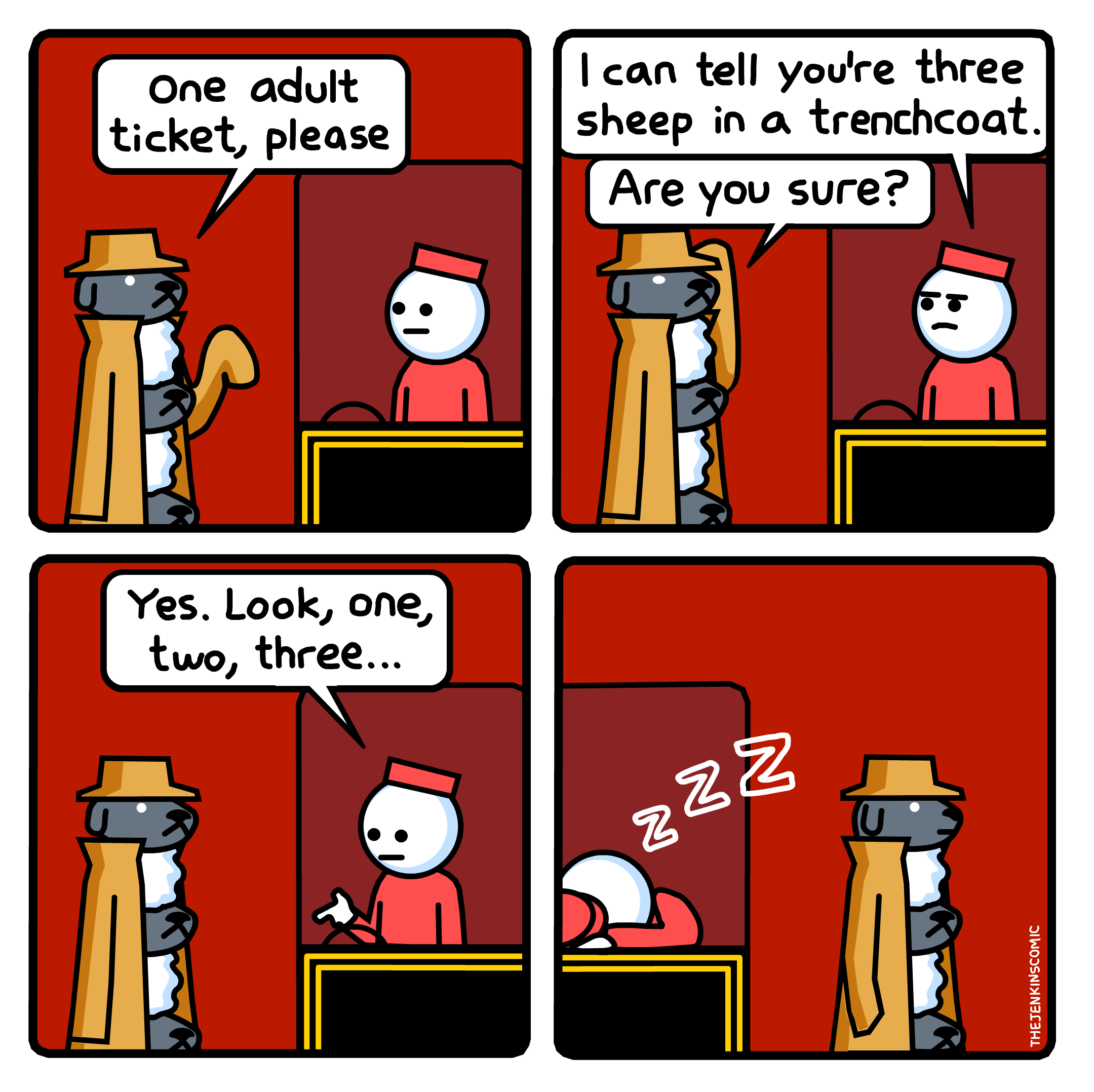Remoto ou presencial?

Se você observar, existe uma contradição entre o trabalho remoto e o presencial.
No lado remoto, o presencial persiste, mas virtualmente. No presencial, o retorno ao local de trabalho se traduz em reuniões virtuais. Um ciclo contraditório.
Trabalhar em um espaço físico para realizar encontros virtuais que poderiam ocorrer de qualquer lugar levanta questionamentos sobre o propósito do presencial.
Paulo Batista, via LinkedIn.
Lollipops and AI don't go together well
LinkedIn popped this story on my personal feed last night, and I felt I needed to share it.
In the story, a man named Gustavo Borges mentions he received a packet filled with lollipops at his house, all properly addressed to him (see the picture, which I’ve borrowed from the text). Aware of the fact that neither him, nor nobody at his house consumes lollipops — not so many at a time, at least —, he started to try to understand how could such a gift have been given to him.

Everything started in December, when he got an Alexa for Christmas and his children started enjoying it — maybe a little too much, apparently. According to him, some days ago his 6 year old daughter asked the AI assistant “what was the smallest lollipop in the world”, question to which Alexa answered there was a lollipop sale going on, and if she would care for some lollipop.
Now, tell me… what child offered lollipops would refuse it?
Long story short, Alexa went on and made a purchase using Gustavo’s credit card… so there’s the answer about where the lollipops came from.
Alexa (and other assistants) will always try to act proactively. That’s why I believe it offered lollipops to be purchased in this case. Gustavo says in his LinkedIn post that Alexa failed to identify that it’s interlocutor, his daughter, didn’t have privileges to purchasing goodies, but I don’t think the machine is to be blamed in this case.
Now, I don’t own an Alexa myself, but I find it very difficult to believe that it doesn’t have security measures to prevent unwanted purchases — come on, even our phone’s app stores have got biometrics and/ or PIN protections, why wouldn’t Alexa have one? So, fiddling with its settings should probably solve (or prevent, in that case) the problem. I’ve got two boys myself, and I’ve always tried to adopt as many safeguards as possible to avoid unauthorized purchasing. Even nowadays, with them already grown — the older one’s 18, the younger, 12 —, restrictions remain active, exactly for accidents prevention sake.
Anyway, more than a discussion about privacy and AI use, there’s a small parenthood lesson here, to be learned by all of us.
Mr. Harrigan's Phone
📚 I was reading “Hollie”, by Stephen King when a character from “If It Bleeds”, a collection of King’s four short novellas, was mentioned by Hollie and I found out she appears in that book, too. So I started reading it — temporarily pausing “Hollie”.
Now, I’ve just read “Mr. Harrigan’s Phone”, the first of the four novellas in the book (not the one where Hollie appears, though), and I had to write about this: Mr. King, one of my all-time favorite authors, is a hell of a storyteller! That story, that I found out was turned into a Netflix movie, was very good — it flowed so well that, when I saw it, it had already finished.
Now I’ll watch the movie, as well. It probably won’t be as good as the novella (to me movies never beat their paper counterparts), but I’m sure it’ll yet be nice.
On cancelling streaming services
About one-quarter of U.S. subscribers to major streaming services—a group that includes Apple TV+, Discovery+, Disney+, Hulu, Max, Netflix, Paramount+, Peacock and Starz—have canceled at least three of them over the past two years, according to November data from subscription-analytics provider Antenna. Two years ago, that number stood at 15%, a sign that streaming users are becoming increasingly fickle.
Americans Are Cancelling More of Their Streaming Services
I’m not an American myself, but this is quite interesting. Truth be told, it’s past time that I do such an analysis myself, to decide on what streaming services to keep, and which ones to let go.
Happy New (Reading) Year
I couldn’t quite meet my reading goal in 2023. From the 20 books I meant to read I only got 17, and despite being very near the objective, not reaching it made me very sad. For 2024, I’ve decided to keep the goal, that is, read the same 20 books I meant to read before. But there’ll be a twist, aiming at my own happiness.
Part of the reason of my not being able to read the 20 books set for 2023 lies in a simple explanation: I mixed too much fiction and non-fiction. I love reading the first, and I dislike (hate?) reading the latter, doing so just because I have to, mostly because of professional reasons. The thing is, although I’ve never measured it properly, I believe it must take me almost 4 times to read non-fiction compared to fiction (now I’ll have to make this calculation and post about it).
So I decided to be happier in 2024. These 20 books will be my goal, as I’ve said above — but they’ll be 20 fiction books. I’ll read non-fiction using my non-fiction rule and taking my time. This is certainly going to make me happier this year.

And I have to say, before finishing this post, that I was fiddling with the idea of writing this post already, but it came to be faster, after I saw Tom Gauld’s New Year’s Resolution comic, one he published last Monday. As an avid reader, I’ve always loved his comics, all about books and reading, so I have to agree with him once again: THIS YEAR I WILL READ FOR FUN.
Descobri mais uma forma de odiar telemarketing
Estava em meio a uma atividade em home office na última sexta-feira quando meu celular resolveu tocar. No visor, um número que eu desconheço. Como invariavelmente faço nessas ocasiões, recusei a chamada, apenas pra que uma nova, do mesmo número, tocasse logo em seguida.
A resposta da minha parte foi a mesma. Número desconhecido? Chamada recusada. Não satisfeito, o tal chamador tentou, ainda, uma terceira vez. O número era de um telefone celular e por isso não o identifiquei diretamente como telemarketing — (des)serviço que, aqui no Brasil, a Anatel obriga a ser identificado com o prefixo 0303 desde o ano passado. No entanto, o fato de eu nunca ter visto o número antes e de seu código ser da capital me fizeram desconfiar de que seria uma chamada não solicitada.
A insistência parou depois da terceira chamada não atendida, e foi quando eu pensei finalmente ter me livrado da inconveniência. No entanto, para minha surpresa, eis que cerca de 1 minuto depois recebo uma mensagem de áudio através do meu WhatsApp. Uma mensagem de áudio do mesmo número desconhecido.
Eu juro que não acreditei no que estava vendo: não satisfeito com o fato de eu não ter atendido, o chamador me mandou um áudio no WhatsApp! E é claro que isso me intrigou a ponto de eu ouvir a tal mensagem, que, como eu suspeitava, era não solicitada e, de certa maneira, caracterizada como telemarketing.
Olha a mensagem do cidadão:
“Fala Daniel! Boa tarde, cara! Tudo bem? Meu querido, eu te liguei mas eu vi que você deve estar ocupado. Meu nome é xxxxx e eu sou assessor de investimentos aqui da [empresa grande e conhecida que faz telemarketing não solicitado e irritante]. O motivo do meu contato é pra te convidar pra tomar um café aqui no meu escritório, pra te apresentar as soluções que temos aqui e que têm facilitado muito a vida dos nossos clientes (blá blá blá) se não der pode ser on-line também. Qual seria a melhor data pra você?”
Não tive dúvida. Bloqueei o número, que pelo menos estava registrado no WhatsApp como empresarial. O motivo que escolhi? Conteúdo não solicitado. Fiquei muito irritado com essa história. Quer dizer que agora se eu resolvo recusar uma ligação, recebo um áudio como prêmio? Sinceramente, inadmissível isso.
Ainda pior é esse tom, todo amistoso. Como se a pessoa me conhecesse de algum lugar, como se fôssemos próximos ou íntimos. E ainda me chamando de “meu querido”. Detesto isso, acho extremamente forçado e pouco profissional no caso específico desse áudio.
Eu odeio telemarketing. Sempre odiei. Sei que tem quem precisa trabalhar fazendo essas ligações e abordagens, mas não é nada contra as pessoas, e sim contra o método. Acho antiquado e ineficiente tentarem vender serviços ou produtos com essa abordagem, tanto inconveniente quanto irritante.
E agora arrumei mais uma forma de odiar essa prática. Espero do fundo do meu coração, embora não bote tanta fé nisso, que esse método de abordar as pessoas não vire moda.
About happiness
Happiness is not so much about what is happening today, what is happening now. I mean, everyone bumps into an obstacle sometimes, or has doubts about what to do at a certain moment... everyone is subject to have a bad day. And that's normal. That's life.
Happiness is more about looking at the big picture. More about observing the path through which you've walked and what you have accomplished so far. More about realizing whether you've been progressing or not.
Happiness is more about continuously improving, about making today better than tomorrow, and tomorrow better than today. Be that personally or professionally. And realizing that feels so good, because it breaks you free from so many things.
LLMs em 1984
Enquanto fazia minha releitura de 1984 hoje pela manhã, me deparei com o seguinte trecho:
Debaixo da janela, alguém cantava. Winston olhou para fora, protegido pela cortina de musselina. O sol de junho ainda brilhava alto no céu, e no pátio ensolarado abaixo, uma mulher monstruosa, sólida como um pilar normando, com braços vermelhos e musculosos, e um avental de juta amarrado no meio do seu corpo, cambaleava para um lado e para o outro, entre um tanque e um varal, pendurando uma série de coisas brancas que Winston reconheceu como fraldas de bebês. Quando sua boca não estava tampada com prendedores, ela cantava num contralto poderoso:
Era apenas um desejo fantasioso
Passou como um dia de abril
Mas um olhar e uma palavra e os sonhos despertaram
Eles roubaram meu coração!A canção assombrava Londres havia semanas. Era uma das inúmeras músicas similares lançadas para o bem dos proletas por um subsetor do Departamento de Música. As letras dessas canções eram compostas sem qualquer intervenção humana num instrumento conhecido como versificador. Mas a mulher cantou de um jeito tão afinado que transformava aquela porcaria tenebrosa num som quase prazeroso.
— George Orwell, 1984
Foi virtualmente impossível para mim não pensar que George Orwell, sempre à frente do seu tempo, ao criar em sua ficção o versificador — um dispositivo capaz de produzir conteúdo criativo sem que nenhum membro do partido tivesse que se envolver diretamente, incluindo-se filmes, romances de baixa qualidade, letras de música e até conteúdo esportivo, policial e sobre astrologia a ser publicado em jornais —, acabou gerando uma clara alusão aos LLMs modernos.
The Schilda horse
I love this story.

The citizens of Schilda possessed a horse with whose feats of strength they were highly pleased and against which they had only one objection — that it consumed such a large quantity of expensive oats. They determined to break it of this bad habit very gently, by reducing its ration by a few stalks every day, till they had accustomed it to complete abstinence. For a time things went excellently: the horse was weaned to the point of eating only one stalk a day, and on the succeeding day it was at length to work without any oats at all. On the morning of that day the spiteful animal was found dead; and the citizens of Schilda could not make out what it had died of.
— Anonymous, German folklore parable, as retold by Sigmund Freud in The Origin and Development of Psychoanalysis and during his concluding lecture at Clark University in 1910.
That parable has so many possible interpretations, but my favorite one is that any optimization has its limits.
You can optimize resources in order to save money. You can optimize a process so it becomes faster or has the quality of its output improved. You can optimize your text so it becomes more legible or clearer.
But exceed it a bit and an essential resource might start lacking. Exceed it and the process stalls or outputs defective items instead. Clear too much of the text you're writing and its sense disappears, its message isn't put across.
Knowing when reducing the horse's ration is already enough is a challenge. And one needs to take care so no one starves in the process.
What if words cost money to write?
I've never made a secret of how much I love to write. The fact I'm keeping this site for as far back in past as 2002 is proof of it. I write my thoughts, my opinions and ideas. I write short stories, and even notes and journal entries here. And I write all of these things without ever worrying about using even a single word less than I've used.
I'm indeed a wordy, long-winded person.
I use long sentences all the time but they don't necessarily come out on purpose. It's just that when I finish writing a paragraph, there they are. And I don't have a lot of problems because of that... and that's what makes me keep on using them.
But what if words cost me money to write? Say, a penny each.
I'm taking this "better business writing" course this week, and the teasing came from the instructor, who said that on her business writing workshops, she always tells her students to think about it. It does make you think twice about what to write, doesn't it?
After all, you gotta cut on your expenses.
Of course, I don't do business writing here. But I do it professionally, and that's why I consider it a good thing to be able to cut to the chase when needed, to put important information first when needed. It's a valuable skill to have. But the thing is, I'm grateful for written words being free. This way I'm able to speak my mind the way I want, whenever I want. Isn't it wonderful?
Para ler quando estiver estressado ou ansioso
Navegar um mar de problemas pode parecer mais difícil do que realmente é.
Se você está em um momento estressante, testa reduzir o zoom: 🔎 — afasta, afasta, afasta 🌎.
O mesmo momento, um outro ângulo.
Qual o tamanho do problema a longo prazo?
Perspectiva pode transformar uma tsunami em uma gotinha — Podemos sempre brincar de mudá-la 🙂
O homem injusto
“Me encontre aqui no centro”, diz o homem injusto.
Você dá um passo em direção a ele. Ele dá um passo para trás.
“Me encontre aqui no centro”, diz o homem injusto.
Traduzido do post do escritor A.R. Moxon. Fantástico.
Overheating
When I mentioned in my latest weeknote, that the interior of the São Paulo state — where I live — was about to experience the second heat wave strike this year, and that the temperatures would be skyrocketed, I could never imagine this.
By this, in both italics and bold, I mean temperatures coming up to 41°C (105°F) or 42°C (107°F). The air conditionings from both my bedroom and the kids' working to the point of not being any more effective, and even causing us to feel hot... maybe the poor appliances have gone the way of the dodo, I really don't know. Meanwhile, the two fans I have home only mostly served to spread hot air. It's awful.
So awful I'm obliged to say that I've been overheating this whole week. There are moments, these days, that I'm almost completely unable to work properly. The company I work for, the people with whom I work and that I know are counting on me, cannot — temporarily — rely on me because of my brain's working in slow mode. It's awful.
We had a one-day holiday in Brazil yesterday, to celebrate the Brazilian proclamation of the Republic, thus I took the opportunity to go to the pool and try to refresh myself better. It was wonderful to feel a little better. But the moment I left the pool there it came again, the heat. And it was awful.
According to the news (in Portuguese), temperatures are expected to progressively fall by the next days, but not without first reaching their peaks. I'm not sure how to deal with so much hot weather till them. I hope not to be doomed.
Saudades of my grandmother
With the All Souls' Day way behind us now, I do regret not having taken the time to talk about my grandmother Amélia. She was by my and my sister's side during our whole childhood, taking us to and bringing us from schools, the doctor and pretty much everywhere else while our parents worked. She fixed us our meals, helped us dress and entertained us with her stories… she did so much.
When she left us in 2012 the pain was so much. I cried a lot, I missed her a lot, and I do miss her to date. This last couple of weeks some things happened that made me think of her very often — what would have she said? What advice would she give me? She had such a simple way to look at things.
At times like this, when memories about her come, being a native Brazilian Portuguese speaker makes me happy. It means I can feel saudades.
Saudade is one of the most beautiful words in the entire world, yet, it incredibly has no English equivalent.
Saudade, this Portuguese word that refers to a melancholic longing or yearning, to a sense of loneliness and incompleteness, constant desire for something — or someone — that does not and probably cannot exist anymore, at least not in the physical sense.
Writing about saudades helps placate them. I love my grandma and always will.
Persistent technology
I came across the Skeptics' Guide to the Future, by Steven Novella, totally by chance this week.
This book discusses how past futurists foresaw the future, arguing about what they got right or wrong, and this made me instantly start reading it. Among other things it argues how much people tend to underestimate how long technology from the past will persist into the future.

It made me think of The Jetsons, the classic Hanna-Barbera cartoon I loved watching as a kid. In their 1962 vision of how a meal would be prepared in the 21st century, all it took was the clicking of some buttons on panels for your food to show up on the table from compartments opened as soon as cooking was (almost instantly) done.
Except that in the 21st century, modern cooking — shopping for groceries, cutting, slicing, baking, grilling, — hasn't changed so dramatically. Anyone from 50 (or even more) years ago, depending on the recipe, could perfectly recognize the process.
So, old technology can really stick. And I love how some old technology is part of my life, living side by side with my smartphone and microwave. I love TV, something invented in the 1950's, and I'm still wearing a wristwatch, no matter how old fashioned it might make me look, because I love to check the time the way my father taught me to do.
I also like paper books better than my Kindle ones because of their bonus feature: the unbeatable nice smell. And I love listening to the radio, specially while I drive, because that's my favorite way to be updated with news. Driving, by the way, is still done on the ground. And our modern cars would likely look ordinary to any drivers from the 1950s, except, of course, if they checked inside and saw the GPS and things like parking sensors and cruise control.
All of this makes me wonder how people mix old and new technology in their own lives…
Infoxication

Wander around the web long enough and the chances are you'll end up coming across the latest buzzword, the coolest terminology of the week, sometimes even of the day. Today I came across infoxication, a term I had never heard before.
Infoxication, according to what I briefly learned, refers to the state of being overwhelmed or excessively bombarded with large amounts of information. A person can become infoxicated if they are exposed to an abundance of information big enough to exceed their capacity to effectively process and comprehend it. This may lead to feeling overwhelmed, distracted, and having difficulty making sense of or prioritizing the information.
OMG. Looks like a modern era disease to me.
Fortunately, one I have been using some medicine to combat: my RSS feed subscriptions, for one. My absence from main stream social media, for another, which helps ignoring the FOMO. And journaling — be it in private or in public, like now, when everything else fails.
Making peace with my reading
Nine books. Until earlier this week this is the number of books I was currently reading, and that anyone visiting my Literal.club profile would see.
Some might say it's too much to read in parallel, but I prefer to consider that they're all stories being concurrently followed along… like many people do with TV and/ or streaming, following many episodes of many shows at a time, except that these are made not of images, but of words.
It's all tsundoku's fault, as I like to say.
But nine books at a time was starting to feel, say, a little too overwhelming, even for someone like me. And worst of all, even feeling overwhelmed I just didn't want to give up on reading any of them. Yeah, for some odd reason that escapes me now, I had totally forgotten about my rule of the three.
But then, while talking to my son this week, I mentioned how three of these nine readings were not entertaining me at all, but, instead, getting on my nerves. The first was a book about learning techniques. The other two, about the Japanese language. From the first one I was hoping to get additional insights for my lifelong learning journey. From the latter books, I was just trying to get hints on Japanese that maybe, hopefully, would make the language stick easier to my mind.
In retrospect, it seems that besides forgetting my rule of the three, I also forgot my principle for what is reading a non-fiction book. So double blame it on me.
I really needed to make peace with my reading because I crossed the point where it stopped being fun or enjoyable, or entertaining.
That's when my son reminded me of my own rule, the rule of the three. In conjunction with what I consider the definition for “read” in the case of non-fiction books, I wound up reaching two different conclusions.
I had already learned the insights I wanted in the case of the book about learning techniques, so I stopped reading it where I was, and that's ok. And regarding the books about Japanese, I decided to abandon both — not because I wouldn't profit from them, but because I wouldn't profit well enough from them right now, as my knowledge about Japanese language is still minimum. So I'll return to them in the adequate moment. No pressure.
In the end not only did I like the decisions. I also got happier with reading and picked up Elven Star again — a (very nice) fantasy fiction book I had suspended reading in favor of these three aforementioned non-fictions. Everybody (me, myself and I) wins.
The rule of the three
We live in a world currently dominated by new media releases, everyday, all the time. Wherever I look there's always a new TV show, a new movie, a new book — and for me, most recently —, a new anime or a new manga. All of them are great, all of them the kind you wouldn't like to miss, because… well, just because.
It is humanly impossible to keep up with everything newly released so I don't even try. But for those released media that do call my attention, I try to be very selective. That's why I've come up with a personal principle, a rule: I call it the rule of the three. And to be clear, that's a practice I've developed after having seen it (or read about it, or listened to it, I just can't recall it) or a close version of it, so I'm not claiming originality, far from it.
The rule is very simple: I take a book, and read three chapters into it. I take a TV show and watch three episodes of it. After that, I decide whether I'm hooked or not. Has it been interesting or compelling so far? if I answer yes, then me and myself have a deal, and I keep reading the whole story, or watching the whole TV show season.
With movies, it's honestly harder for me to apply the rule of the three, mostly because 3 minutes into a movie plot there usually isn't any guarantee so much will have been perceived about the plot. So I might double, or triple the time — even round it to ten whole minutes depending on the circumstance. But the idea remains: have a feel of the general idea, the overall plot and weight the worthiness of my while. Easy.
To be honest I may also occasionally read one or two additional chapters of a book or watch a couple more episodes — also to grab the story and its potential value.
Believe me when I tell you: my rule of the three has been with me for quite some years now, and it has spared me from spending — wasting — precious, limited time. This way I could redirect my time and enjoy the best content possible among the endless possibilities.
Counting sheep
Sheep in human clothing has got to be one of the funniest comics I’ve ever seen in my life. I had seen it before and completely forgot about it until this week I came by it again. That’s from The Jenkins Comic, an awesome site to be followed, if you ask me about my opinion.

The barking of Luke
Do you have a dog? Does he bark a lot?
Here, no one can leave the house without Luke, our dog, accompanying us, while barking along the way. He simply loves barking, either to show that he wants to go with us, or because he detects the presence of people he doesn't know.
Think of a suspicious animal.
This week, in one of the times I needed to take out the trash, Luke came, barking from the furthest depths of the house. When I opened the door he didn't stop. And as I closed the door, I noticed that the neighbor was outside, coincidentally with his dog, who he was going to take for a walk.
We got into the elevator and he laughed; he told me that my dog really likes to bark. So much so that the other day Luke even scared his dog (one of a much bigger breed, by the way). And given the amount of Luke's daily barking, no one in their right mind would be able to justify what the neighbor said.
What I didn't know is that Luke's breed, the Yorkshire terrier, is notorious not only for its great intelligence, but also for its barking! This breed is made of small but full of attitude dogs. All of them are extremely territorial, which means they feel the need to protect their home against intruders — and it is this need to protect that causes them, including Luke, to start barking at the slightest sign of noise that appears.